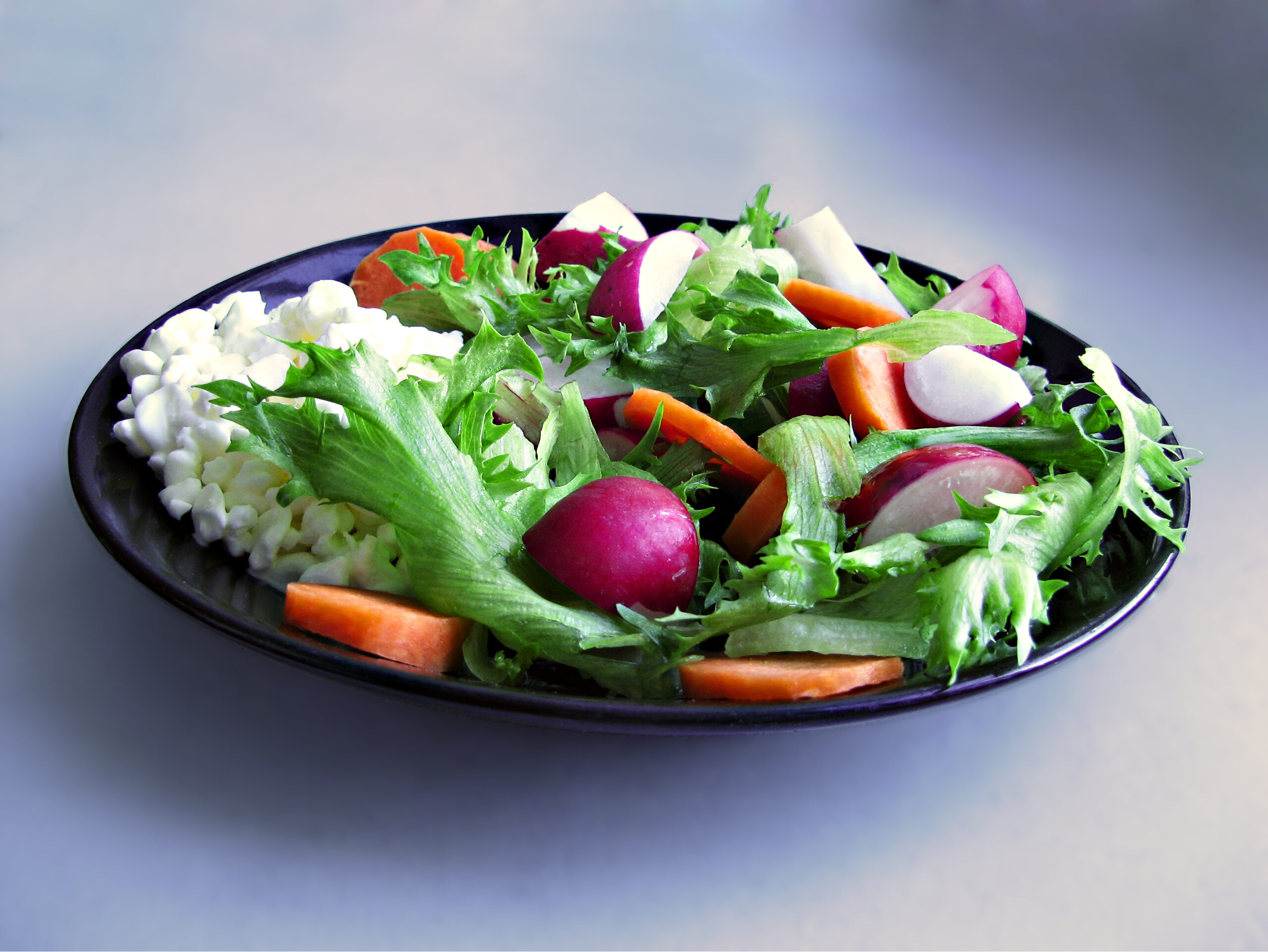The vegetarian diet is a diet that excludes proteins of animal origin from the diet for ethical, environmental or even health reasons. Although there are several variants of vegetarianism, meat, fish, seafood and eggs are often banned in favor of vegetable proteins such as soybeans, legumes or cereals.
Characteristics of the vegetarian diet:
- Rich in fiber and micronutrients
- Importance of food combinations
- Protector against overweight and cardiovascular disease
- Different variants exist
- Rich in culinary discoveries and nutrients
The main principles of the diet
The vegetarian diet has been practiced for millennia, it was first called « vegetable diet » or « xerophagy ». Several ancient Greek philosophers were vegetarians . Because of his writings on the subject, Pythagoras is also considered the father of vegetarianism. Individuals who excluded meat from their diet have long been called “Pythagoreans”. Over the years, many other famous thinkers (like Leonardo da Vinci, Benjamin Franklin, Mahatma Gandhi and Albert Einstein) embraced vegetarianism. More recently, Brigitte Bardot, Aymeric Caron, Moby, Yoko Ono and Paul McCartney have publicly defended vegetarianism in their positions and events.
How does the vegetarian diet work?
Different reasons can lead to adopting a vegetarian diet, including:
- Prevention of certain diseases (cardiovascular disorders, diabetes, obesity, hypertension, osteoporosis, infections, constipation, cancer)
- Interest in animal welfare
- The environmental Protection
- Respect for religious precepts, in certain cases
In any case, the vegetarian diet consists in banishing animal flesh in favor of vegetable proteins.
Lacto-ovo vegetarian, vegan, pesco-vegetarian diet: what are the differences?
There are diets close to the vegetarian diet which have their specificities:
- The lacto-vegetarian diet, which consists of consuming dairy products but no eggs
- The lacto-ovo-vegetarian diet which allows you to consume dairy products and eggs, but no meat or fish
- The pesca-vegetarian diet, which consists of consuming fish, dairy products, and eggs but no meat
- The flexitarian diet, which consists of reducing your meat consumption most of the time
- The vegan diet, which excludes all foods of animal origin (including dairy products, eggs and honey)
Should you follow a vegetarian diet to lose weight?
It has been proven that people following a vegetarian diet have a lower than average BMI, this is supported by the fact that adopting a restrictive diet such as vegetarianism leads to a better balance of food intake and to consuming less food. from the food industry.
In addition, the vegetarian diet, by excluding meat, contributes to the fight against cardiovascular diseases, especially caused by the saturated fatty acids found in meat. Vegetarians generally have lower cholesterol levels than the omnivorous population due to this lack of fatty meat in their diet. If it is well practiced, the vegetarian diet is rich in fiber provided in particular by vegetables and whole grains, it thus helps to fight against constipation, diabetes and transit disorders.
It would also reduce the risk of prostate and colon cancer, thanks to an abundance of fruits and vegetables, a low fat intake and the absence of smoked, charred or nitrite-containing meats. Finally, the absence of meat would almost completely eliminate the risk of contracting infections related to bacteria or viruses present in it (H. pylori, Campylobacter, bovine spongiform encephalopathy, etc.). Salmonellosis on the other hand could still be contracted through the consumption of eggs.
How long does the vegetarian slimming diet last?
The vegetarian diet is one of the lifestyles often adopted throughout life. Whatever the reasons (ecological, ethical, health, etc.), it is therefore a diet that does not have a limited duration.
Allowed and prohibited foods
Vegetarian food includes all food categories excluding meat and fish, so we find starchy foods and cereals, fruits and vegetables, dairy products and eggs, fats, legumes and sweet products. .
Dietary program and menu for a balanced vegetarian diet
| Breakfast | Wholemeal bread Vegetable margarine or butter Orange jam Milk Coffee |
| Lunch | Cucumbers Coral lentil curry with coconut milk Basmati rice Cheese Banana |
| Snack | Apple Some almonds |
| Having dinner | 1/2 spiced avocado Potato omelet Roasted peppers Plain yogurt |
Advantages and disadvantages
The positives of the vegetarian diet
- Prevention of cardiovascular pathologies
- Good fiber intake
- Significant feeling of satiety
- Great dietary diversity
- Maintaining a healthy weight more easily
- Rich in culinary discoveries
The negative points of the vegetarian slimming diet
- Bad Omega-6/Omega-3 ratio
- Risk of iron deficiency if the diet is poorly conducted
- Requires cooking
- bridge
- Allergies (overview)
- Achluophobia : all about the fear of the dark
- At what age can you do bodybuilding?
- Fatigue in the morning: causes and remedies
Recommendations and precautions to take
Are there any risks of deficiencies with the vegetarian diet?
It is sometimes mistakenly believed that vegetarians lack protein. The well-balanced vegetarian diet meets all needs. Vegetarians get protein from milk and dairy products, eggs, legumes, tofu, nuts, seeds, nutritional yeast and grain products. The proteins of the vegetable kingdom are not complete in themselves, but they become so by making certain food combinations. You can, for example, accompany the lentils with rice. You don’t need to supplement protein at every meal. Cereals can be eaten for breakfast and legumes for the evening meal so that the body replenishes complete proteins.
On the other hand, in a vegetarian diet, it is not uncommon to find nuts, seeds and vegetable oils: the intake of omega-6 fatty acids can therefore be too high compared to omega-3 fatty acids. In this case, it is preferable to reduce oils rich in omega-6 — sunflower, soybean, wheat germ, corn, grapeseed — and to favor sources of omega-3: seeds and flax oils, rapeseed, hemp seeds and oil, chia seeds, marine micro-algae.
Finally, with frequent consumption of legumes and green vegetables, vegetarianism does not carry the risk of iron deficiency. On the other hand, if these foods are forgotten in the menus, this can lead to a situation of anemia leading to drug supplementation.
Is this a diet for you?
Vegetarianism can be a good solution for you if you want to adopt a lifestyle that respects the environment, animal welfare and your own health. Do not hesitate to be accompanied in the first months of your new diet to fully understand the issues and the food combinations to be made for a balanced vegetarian diet.
Can the vegetarian diet be followed by the athlete (bodybuilding)?
Absolutely, as we have just seen, the balanced vegetarian diet provides enough protein and micro-nutrients to the body. It is therefore completely compatible with regular physical activity of varying intensity.
How not to regain weight?
Even though the average BMI of vegetarians is lower than that of other people, this diet is not intended for weight loss. So there is no reason to gain weight afterwards. In addition, vegetarianism is part of the lifestyles generally adopted in the very long term, it is not of limited duration.
What is the scarsdale vegetarian diet?
The scarsdale method consists of a very low calorie and low carbohydrate diet that would allow you to lose up to 9 kilos in 14 days. There is a variant compatible with the vegetarian diet. However, due to its very restrictive nature, it is not a recommended weight loss method.
A few figures to go further
In France, more than 30% of individuals define themselves as being flexitarians. This trend is observed all the more among well-to-do people over the age of 50. However, among those under 35, reducing meat consumption is becoming more widespread. Similarly, 50% of individuals would like to increase their consumption of plant products.
Less than 3% of French people are strict vegetarians, and less than 2% are vegan.
Opinion of the dietician on vegetarianism
Vegetarian eating is becoming increasingly popular due to its health benefits and growing interest in preserving our environment. It is a balanced diet perfectly adapted to any age of life, subject to composing your plate in a reasoned way by providing proteins at each meal (legumes, dairy products or eggs) and vegetable fats rich in omega- 3 (rapeseed, flax, hemp, etc.).

